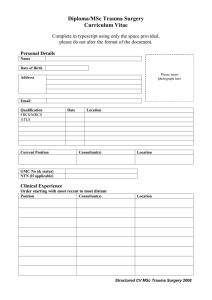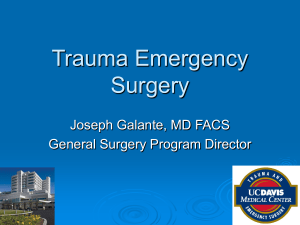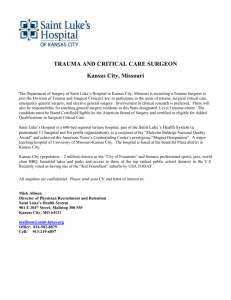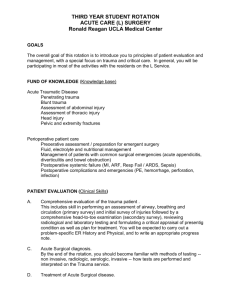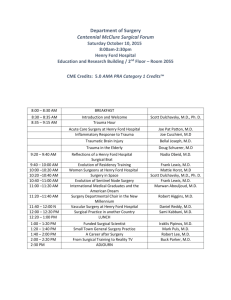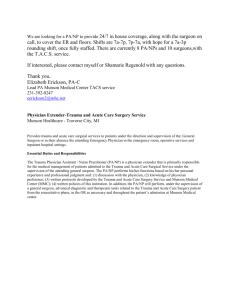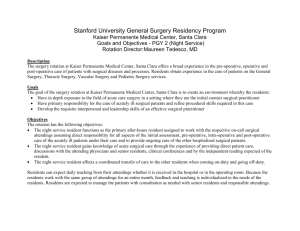Trauma ACS PGY2 - Scalpel
advertisement
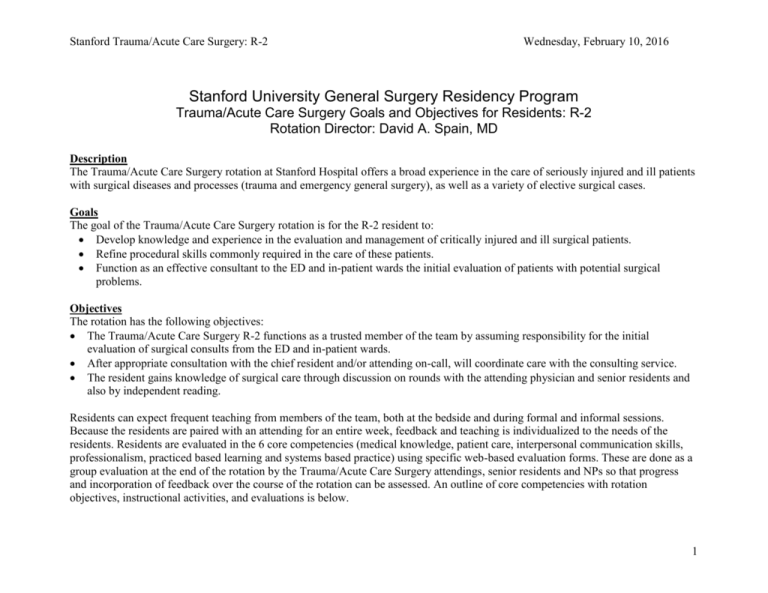
Stanford Trauma/Acute Care Surgery: R-2 Wednesday, February 10, 2016 Stanford University General Surgery Residency Program Trauma/Acute Care Surgery Goals and Objectives for Residents: R-2 Rotation Director: David A. Spain, MD Description The Trauma/Acute Care Surgery rotation at Stanford Hospital offers a broad experience in the care of seriously injured and ill patients with surgical diseases and processes (trauma and emergency general surgery), as well as a variety of elective surgical cases. Goals The goal of the Trauma/Acute Care Surgery rotation is for the R-2 resident to: Develop knowledge and experience in the evaluation and management of critically injured and ill surgical patients. Refine procedural skills commonly required in the care of these patients. Function as an effective consultant to the ED and in-patient wards the initial evaluation of patients with potential surgical problems. Objectives The rotation has the following objectives: The Trauma/Acute Care Surgery R-2 functions as a trusted member of the team by assuming responsibility for the initial evaluation of surgical consults from the ED and in-patient wards. After appropriate consultation with the chief resident and/or attending on-call, will coordinate care with the consulting service. The resident gains knowledge of surgical care through discussion on rounds with the attending physician and senior residents and also by independent reading. Residents can expect frequent teaching from members of the team, both at the bedside and during formal and informal sessions. Because the residents are paired with an attending for an entire week, feedback and teaching is individualized to the needs of the residents. Residents are evaluated in the 6 core competencies (medical knowledge, patient care, interpersonal communication skills, professionalism, practiced based learning and systems based practice) using specific web-based evaluation forms. These are done as a group evaluation at the end of the rotation by the Trauma/Acute Care Surgery attendings, senior residents and NPs so that progress and incorporation of feedback over the course of the rotation can be assessed. An outline of core competencies with rotation objectives, instructional activities, and evaluations is below. 1 Stanford Trauma/Acute Care Surgery: R-2 Wednesday, February 10, 2016 Specific goals and objectives for R-2 residents GOALS Core Competencies Knowledge: To acquire and apply knowledge of established and evolving basic and applied clinical sciences that relate to the practice of adult surgical care Patient Care: To provide compassionate, appropriate, and effective surgical care of adults. R-2 OBJECTIVES Knows and applies the principles of Surgical Care such as physiology, pharmacology, and pathophysiology. Demonstrates an investigatory and analytic approach to patients with injury and general surgery illnesses. Prioritizes patient’s disease related states. Designs care plan and anticipate potential complications. Assesses surgical patients including: Physical exam and history Evaluation of appropriate laboratory data and imaging results Recognize physiologic derangements such as shock, respiratory compromise, metabolic derangements, altered mental status and common surgical complications like wound infection and pneumonia. Coordinates treatment of these conditions with the consulting service after appropriate consultation with senior resident and/or faculty and discussion. INSTRUCTIONAL ACTIVITIES Teaching by attending faculty and senior resident. Independent reading. Daily rounds with the Trauma/Acute Care Surgery Team. EVALUATION Ongoing feedback by attendings, senior residents and NPs. Rotation evaluation by Trauma/Acute Care Surgery faculty. (https://stanford.medhub.com) Ongoing feedback by attendings, senior resident and NPs. Rotation evaluation by Trauma/Acute Care Surgery faculty. (https://stanford.medhub.com) Feedback from consulting services (primarily ED). 2 Stanford Trauma/Acute Care Surgery: R-2 GOALS Core Competencies R-2 OBJECTIVES Effective Interpersonal and Communication skills: Residents must communicate in a way that leads to effective information exchange of a care plan to patients, their families, and professional associates. Discusses evaluation and proposed treatment with consulting team after consultation with chief resident and/or attending surgeon on-call. Works effectively with team and nurses to communicate care plan. Practice based learning and improvement: In order to improve patient care practices, residents must be able to critically evaluate their own performance as well as appraise and incorporate clinical scientific evidence. Professionalism: Residents must show a commitment to professional responsibilities, adherence to ethical principles, and sensitivity to diversity. Wednesday, February 10, 2016 INSTRUCTIONAL ACTIVITIES Daily rounds with the Trauma/Acute Care Surgery Team. Identify impact of proposed treatment on outcome and recovery of patient. Use information technology to assimilate medical literature as it relates to patient care. Learns attention to detail in surgical patients. Daily rounds with the Trauma/Acute Care Surgery Team. Displays appropriate demeanor, even in adverse situations. Acts with sensitivity and responsiveness to patient’s culture, age, gender, and disabilities. Maintains accountability to patients, medical profession, and society. Obtains proper consent and confirm advanced directives, if present. Becomes life long learner. Daily rounds with the Trauma/Acute Care Surgery Team. Weekly Trauma/SICU Conference. EVALUATION Ongoing feedback by attendings, senior residents and NPs. Rotation evaluation by Trauma/Acute Care Surgery faculty. (https://stanford.medhub.com) Feedback from MDs a.nd nurses (ED primarily) Ongoing feedback by attendings, senior residents and NPs. Rotation evaluation by Trauma/Acute Care Surgery faculty. (https://stanford.medhub.com) Ongoing feedback by attendings, senior residents and NPs. Rotation evaluation by Trauma/Acute Care Surgery faculty. (https://stanford.medhub.com) Feedback from nurses (ED primarily) 3 Stanford Trauma/Acute Care Surgery: R-2 Wednesday, February 10, 2016 GOALS Core Competencies R-2 OBJECTIVES INSTRUCTIONAL ACTIVITIES EVALUATION Systems-based Practice: A resident must be able to demonstrate an awareness of and responsiveness to the system of health care and the ability to effectively call on system resources to provide optimal care. Use care protocols (Trauma Manual) to improve quality of care. Act as an organizational problem solver for patients with complex surgical problems. Learns how to practice cost-effects health care. Daily rounds with the Trauma/Acute Care Surgery Team. Ongoing feedback by attendings, senior residents and NPs. Rotation evaluation by Trauma/Acute Care Surgery faculty. (https://stanford.medhub.com) 4
